Donald Trump holds first cabinet meeting of this term, asks Elon Musk to give DOGE update
Donald Trump has let rip in the first meeting of his cabinet, as he voiced support for Elon Musk’s controversial jobs ultimatum.
North America
Don't miss out on the headlines from North America. Followed categories will be added to My News.
US President Donald Trump has defended billionaire adviser Elon Musk in front of his cabinet and raised the possibility that some of the more than one million federal workers who didn’t respond to an email asking what they accomplished last week could be terminated.
“Those people are on the bubble, as they say, maybe they’re going to be gone,” Mr Trump said in the first cabinet meeting of his new term at the White House.
The White House said that one million workers responded to the email, or more than 40 per cent of the federal workforce of roughly 2.3 million. But those who hadn’t responded might be dead, suggested Mr Trump.
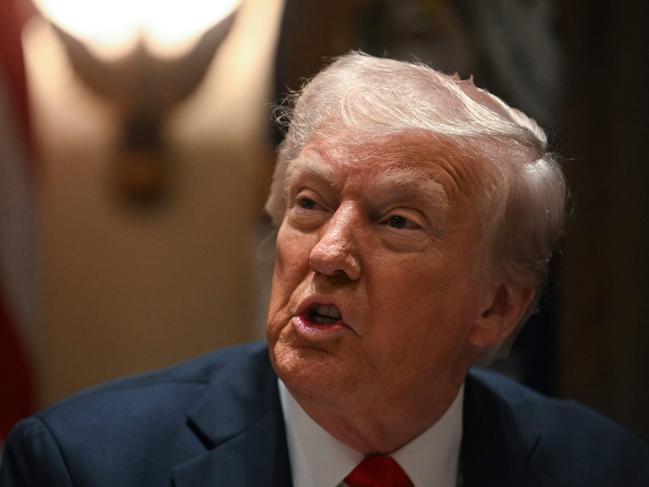
Mr Musk, who is running the administration’s Department of Government Efficiency cost-cutting initiative, said he is confident he can find $1 trillion in savings across the government’s roughly $7 trillion in annual spending, or a cut of 15 per cent.
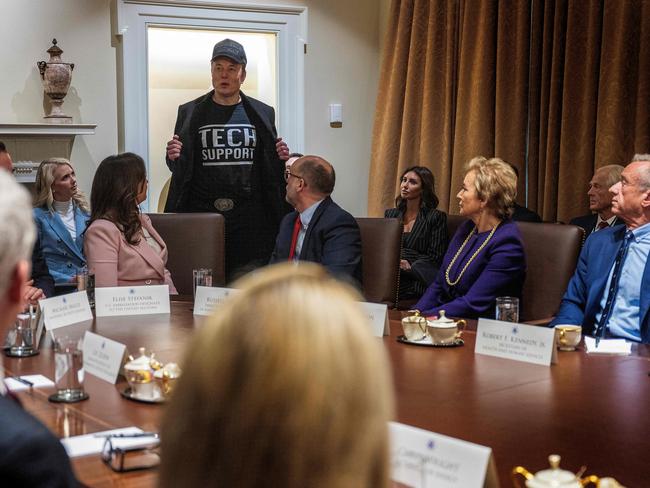
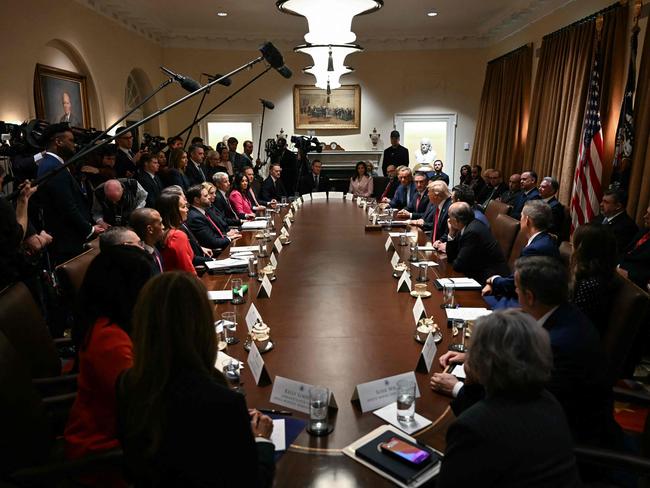
“We’re bloated, we’re sloppy, we have a lot of people who aren’t doing their job, who don’t exist,” Mr Trump said, defending Mr Musk’s DOGE.
Mr Trump praised Mr Musk’s “important initiative” and asked his cabinet if anyone was dissatisfied with his.
Members of the cabinet, seated around a long table in the Cabinet room in the West Wing near the Oval Office, laughed but did not express dissatisfaction.
“Some disagree a little bit, but I will tell you, for the most part, I think everyone’s not only happy, they’re thrilled,” Mr Trump said.
“Is anyone unhappy with Elon? If you are, we’ll throw them out of here,” he added.
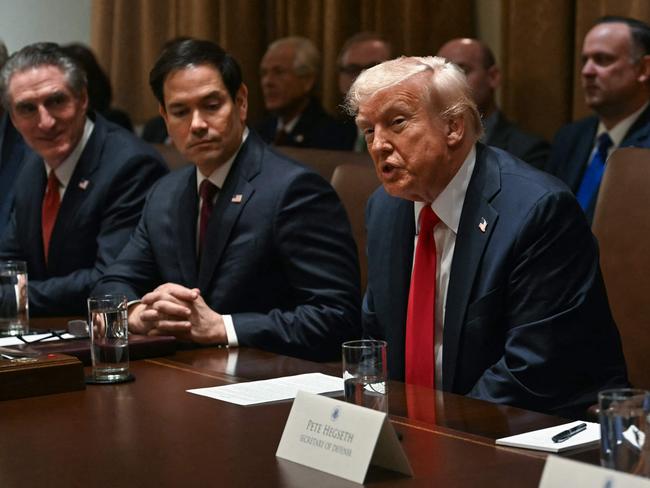
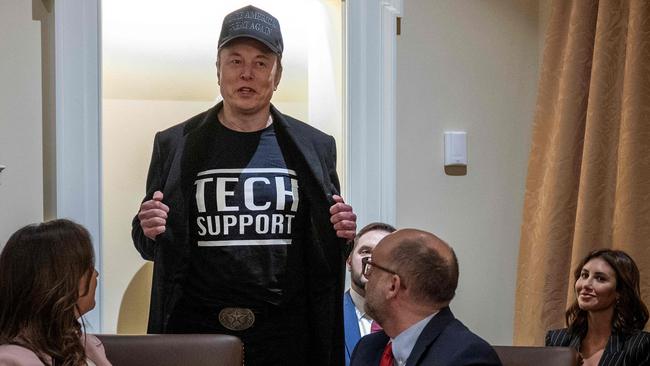
When Mr Trump introduced Mr Musk to give an update on DOGE, the X, SpaceX and Tesla CEO and world’s richest man flashed his T-shirt and introduced himself as “humble tech support” and said the government system is “old” and “the software doesn’t work”.
“Just the interest on the national debt exceeds the Defense Department spending,” he said and warned that America will go bankrupt if it continues. “That’s why it has to be done.”
Mr Musk said his target was to save US$4 billion every day for the remainder of the year. “President Trump has put together the best cabinet, ever”, said Mr Musk.
Mr Trump said, “I have a lot of respect for Elon.”
He said Canada and Europe had taken advantage of the US in trade and described America as a “pot of gold” everyone wants.
“This country has gotten bloated and fat and disgusting and incompetently run,” Mr Trump said, and levelled blame at the Biden administration. He said it was “a disgrace to this nation.”
President Trump also fielded questions from members of the press about issues such as tariffs, Ukraine, and the Middle East.
“We’re negotiating very successfully with Russia and Ukraine,” Mr Trump said. “We very much need rare earth,” said Mr Trump about the Ukraine mineral partnership.
Mr Trump said he wanted to end the war between Russia and Ukraine because of the images of soldiers he had viewed being killed. He also said in addition to the deaths, he didn’t want to spend any more money.
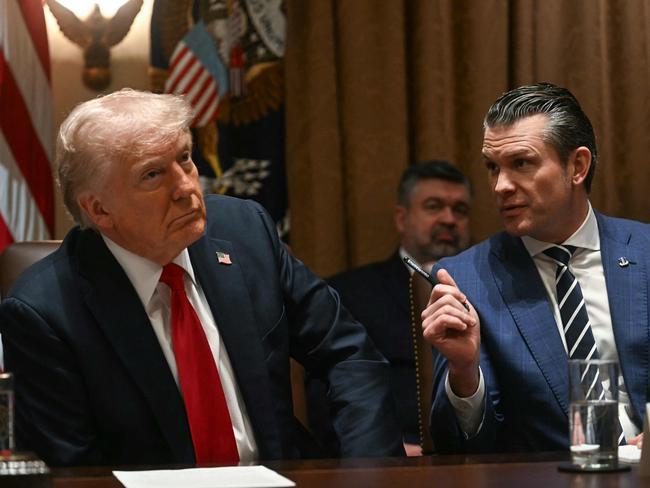
He pivoted to the Middle East and when asked about Gaza he said it was “very sad to see the four bodies of hostages returned.”
“Young people [shouldn’t] die,” he said. “This is a vicious group of people”
He called Vladimir Putin “a very smart guy” who had previously had no “intention of settling the war.”
“I think we’re going to have a deal. If I didn’t get elected I believe he would just continue to go through Ukraine [with] a lot of people killed.”
Mr Trump again blamed Joe Biden for the war and claimed the death toll is much higher than reported.
“Nobody thought you could make peace. I think you can.”
Mr Trump said he “liked all countries” but savaged China, Mexico and Canada (over the fentanyl epidemic he said killed 300,000 Americans a year) for letting the “crap” come into the country.
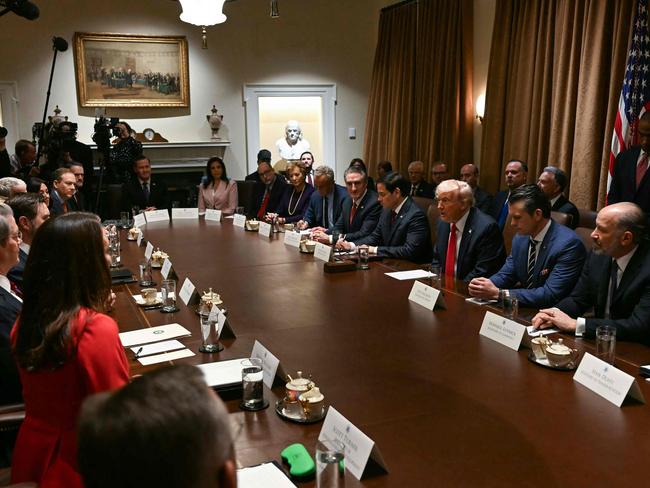
He described the European Union, whose creation was encouraged for decades by Washington, as rooted in an attempt to counter the United States.“Look, let’s be honest, the European Union was formed in order to screw the United States,” Mr Trump said
FOLLOW UPDATES BELOW:
WHITE HOUSE EXPLAINS TRUMP’S BRUISED HANDS
The bruise seen on the back of President Donald Trump’s hand is from him shaking other people’s hands, the White House said.
Mr Trump was photographed earlier this week with a bruise on his right hand as he met with French President Emmanuel Macron at the White House.
“President Trump is a man of the people and he meets more Americans and shakes their hands on a daily basis than any other President in history,” White House press secretary Karoline Leavitt told Fox News Digital in a statement.
“His commitment is unwavering and he proves that every single day,” she added.
“President Trump has bruises on his hand because he’s constantly working and shaking hands all day every day,” Ms Leavitt also told NBC News.
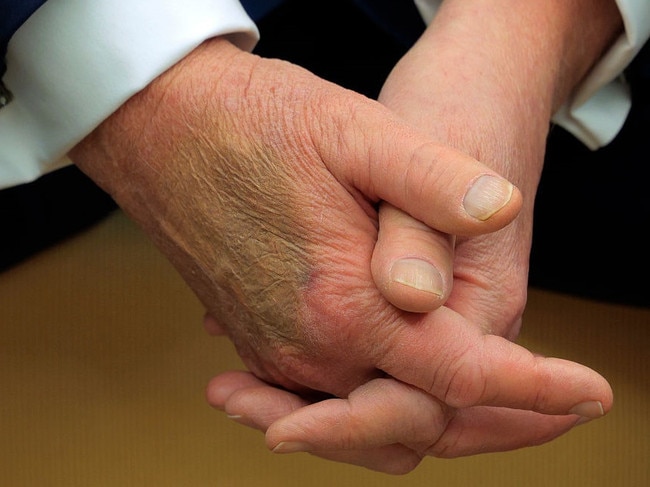
TRUMP TO OFFER $5 MILLION US ‘GOLD CARDS’
US President Trump announced that the US government will soon begin selling A$8 million (US$5m) “gold cards” that convey both green-card residency status and a path to American citizenship to foreigners.
He is predicting one million cards will be sold and saying the initiative could quickly pay down the national debt.
“It’s somewhat like a green card, but at a higher level of sophistication. It’s a road to citizenship for people, and essentially people of wealth or people of great talent,” Mr Trump said in the Oval Office.
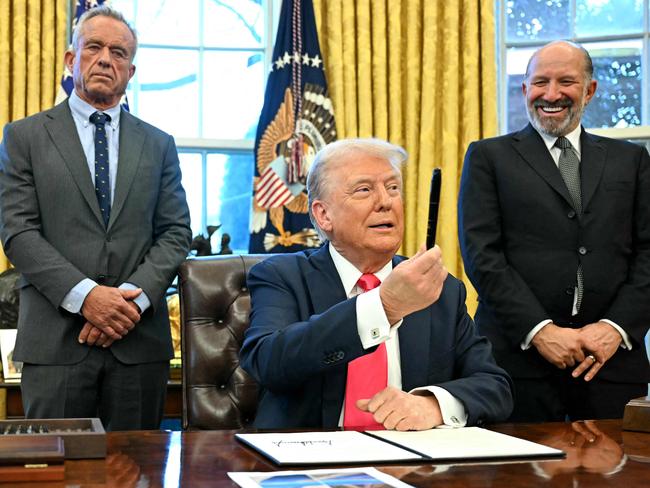
“We’re going to be putting a price on that card of about $5 million and that’s going to give you green card privileges-plus,” the US President said.
“They’ll be wealthy and they’ll be successful, and they’ll be spending a lot of money and paying a lot of taxes and employing a lot of people.”
Mr Trump claimed that the initiative had been approved by administration lawyers and will launch in roughly “two weeks”.
TRUMP SHARES AI VISION FOR GAZA AS SEASIDE RESORT
Donald Trump’s official social media accounts posted an apparently AI-generated video depicting war-ravaged Gaza rebuilt into a seaside resort, replete with a towering golden statue of himself.
The video, which racked up more than 15 million views on Instagram and was shared 15 thousand times on Mr Trump’s Truth Social network by Wednesday morning.
“Trump Gazaâ€.
— Arsen Ostrovsky ðŸŽ—ï¸ (@Ostrov_A) February 26, 2025
Yes, President @realDonaldTrump did just post this Gaza AI video on his social media platforms. And yes it does include this image of him and PM Netanyahu. pic.twitter.com/l40bBkV5P0
The 33 second video “Gaza 2025 What’s Next?” opens with people on a rubble-strewn street emerging from a tunnel onto a beach with palm trees and yachts.
Mr Trump has floated the idea of a US takeover of Gaza under which its Palestinian population would be relocated - a proposal met with global condemnation.
In the clip, the soundtrack includes lyrics such as “Feast and dance, the deal is done, Trump Gaza number one”.
AI-generated renditions of Mr Trump and Israeli Prime Minister Benjamin Netanyahu sip cocktails in swimsuits by a pool, while other shots show what appears to be Elon Musk dancing under a shower of cash on the beach.
A larger-than-life golden statue of Mr Trump is also featured.
“What I know about Trump is that he is a strange but bold president who does what he says he will do. What matters to him is money and investments - there is no humanity,” said Manal Abu Seif, a 23-year-old lawyer in Gaza City.
“Gaza needs freedom, open border crossings and jobs for young people, and is not a playground for tourism and investment,” she added.
US CONSUMER CONFIDENCE DIPS
US consumer confidence in February saw its largest monthly decline since August 2021, deepening a recent slump in optimism in US President Donald Trump’s second month back in office.
American buyers also sharply increased their expectations that inflation would reignite, citing concerns about the impact of Mr Trump’s trade and immigration policy proposals on prices.
The US consumer confidence index fell 7.0 points to 98.3 in February from a revised 105.3 in January, the Conference Board announced in a statement.
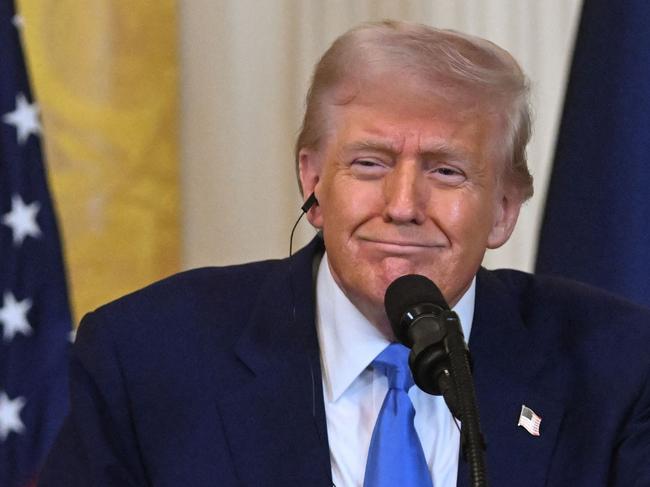
“Consumers’ confidence has deteriorated sharply in the face of threats to impose large tariffs and to slash federal spending and employment,” Pantheon Macroeconomics chief US economist Samuel Tombs wrote in a note to clients.
February’s figures marked the largest monthly decline since August 2021, according to the Conference Board, and returned consumer confidence to its lowest level since June 2024.
The February data was sharply below market expectations of 103.1, according to Briefing.com.
US TREASURER DEFENDS TRUMP TARIFFS
US Treasury Secretary Scott Bessent has defended President Donald Trump’s use of tariffs shortly after he met with Australian Treasurer Jim Chalmers, who is hoping for an exemption from Mr Trump’s steep levies on steel and aluminium imports.
Since taking office in January, Mr Trump has unveiled tariff plans threatening to hit allies and adversaries alike, including 25 per cent levies on steel and aluminium imports to take place next month.
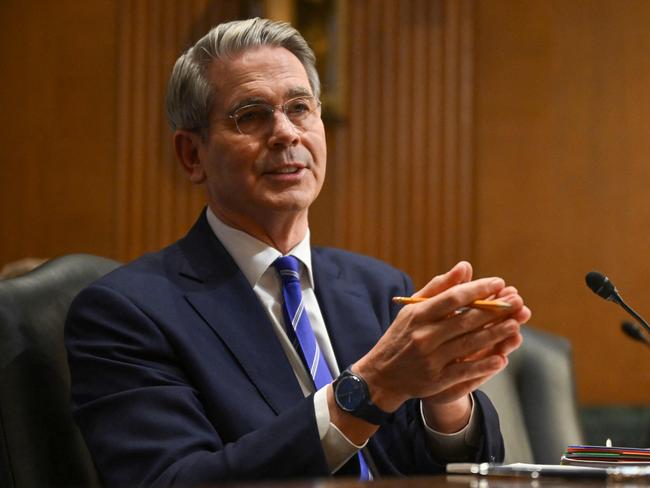
In a wide-ranging speech at the Australian Embassy, Mr Bessent said tariffs are an essential component of Mr Trump’s broader economic strategy.
They can be “an important source of government revenue, which can help fund investments,” he added.
Tariffs can also be “used as a tool to correct and manage the internal imbalances in other economies” by adjusting how much American consumers take in of their excess supply, Mr Bessent said.
On China, Mr Bessent said, “We have to push back and tell them that they cannot export their deflation to the rest of the world,” he said.
Mr Bessent said the Trump administration’s goal is to “reprivatise the economy,” and reiterated a need to end “government waste”.
The Treasury Department will “streamline best practice regulations,” working towards a level playing field, Mr Bessent said.
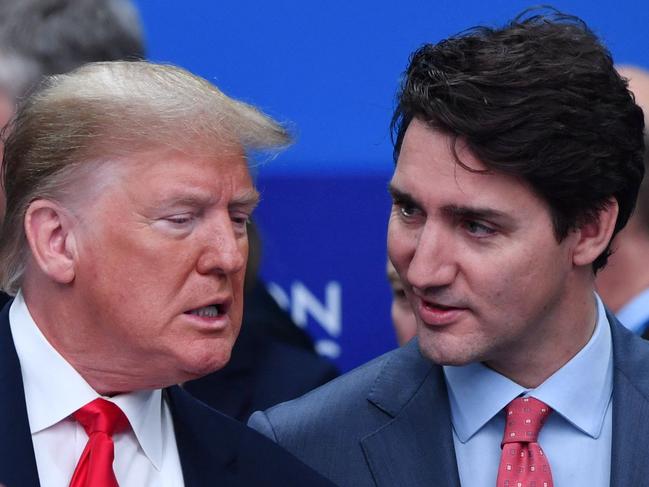
WHITE HOUSE MULLS EXPELLING CANADA FROM INTELLIGENCE NETWORK
A shock suggestion by one of Donald Trump’s key advisers to expel Canada from the Five Eyes alliance has been shot down by Australia, another member of the intelligence network.
The President’s trade adviser Peter Navarro has proposed removing Canada from the Five Eyes group, according to the Financial Times, as Mr Trump threatens America’s northern neighbour with tariffs and maintains he wants to turn Canada into the 51st US state.
Speaking in Washington DC, Australian Treasurer Jim Chalmers said Canada was an important partner in the intelligence network.
“Without knowing the source of that speculation, I would just point out that the Five Eyes community is a very, very important community for Australia and we would like to see its membership remain intact,” he said.
Mr Navarro did not respond when asked by the Financial Times about his radical idea. After the report was published, he denied putting forward the proposal, saying it was “crazy stuff”.
“We would never, ever jeopardise our national security … with allies like Canada,” he said.
Outgoing Canadian Prime Minister Justin Trudeau recently said Mr Trump’s ambition to annex Canada was a “real thing”.
More Coverage
Originally published as Donald Trump holds first cabinet meeting of this term, asks Elon Musk to give DOGE update





